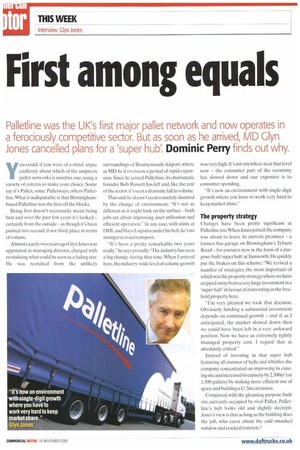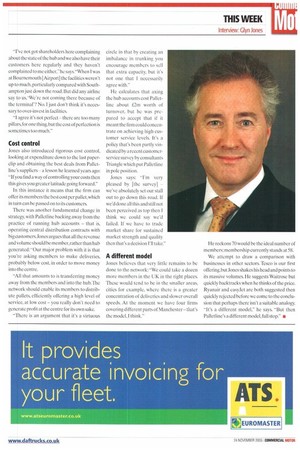First among equals
Page 24

Page 25

If you've noticed an error in this article please click here to report it so we can fix it.
Palletline was the UK's first major pallet network and now operates in a ferociously competitive sector. But as soon as he arrived, MD Glyn Jones cancelled plans for a 'super hub'. Dominic Perry finds out why.
you could. if you were of a mind, argue endlessly about which of the umpteen pallet networks is number one, using a variety of criteria to make your choice. Some say it's Pallex, some Palletways, others Palletline. What is indisputable is that Birminghambased Palletline was the first off the blocks.
Being first doesn't necessarily mean being best and over the past few years it's looked — certainly from the outside — as though it's been pushed into second, if not third, place in terms of volume.
Almost exactly two years ago Glyn Jones was appointed as managing director, charged with revitalising what could he seen as a fading star. He was recruited from the unlikely surroundings of Bournemouth Airport, where as MD he'd overseen a period of rapid expansion. Since he joined Palletline, its charismatic founder Bob Russett has left and, like the rest of the sector, it's seen a dramatic fall in volume.
That said, he doesn't seem remotely daunted by the change of environment: "It's not as different as it might look on the surface — both jobs are about improving asset utilisation and efficient operation." In any case, with stints at DHL and Hays Logistics under his belt, he's no stranger to road transport.
"It's been a pretty remarkable two years really." he says proudly."The industry has seen a big change during that time. When I arrived here, the industry-wide level of volume growth was very high. It's not anywhere near that level now — the consumer part of the economy has slowed down and our exposure is to consumer spending.
"It's now an environment with single-digit growth where you have to work very hard to keep market share."
The property strategy
Changes have been pretty significant at Palletline too. When Jones joined, the company was about to leave its current premises — a former bus garage on Birmingham's Tyburn Road — for pastures new in the form of a purpose-built 'super hub' at Tamworth. He quickly put the brakes on this scheme: "We revised a number of strategies. the most important of which was the property strategy where we have stepped away from a very large investment in a 'super huh' in favour of reinvesting in the freehold property here.
"I'm very pleased we took that decision. Obviously funding a substantial investment depends on continued growth — and if, as I anticipated, the market slowed down then we could have been left in a very awkward position. Now we have an extremely tightly managed property cost. I regard that as absolutely critical."
Instead of investing in that super hub featuring all manner of bells and whistles, the company concentrated on improving its existing site and increased its capacity by 2,300m? (or 1,500 pallets) by making more efficient use of space and building a f.I.5m extension.
Compared with the gleaming purpose-built site currently occupied by rival Pallex, Palletline's hub looks old and slightly decrepit. Jones's view is that as long as the building does the job, who cares about the odd smashed window and cracked concrete? "I've not got shareholders here complaining about the state of the hub and we also have their customers here regularly and they haven't complained tome either," he says. "When I was at Bournemouth [Airport] the facilities weren't up to much, particularly compared with Southampton just down the road. But did any airline say to us. 'We're not coming there because of the terminal"? No. I just don't think it's necessary to over-invest in facilities.
"I agree it's not perfect — there are too many pillars, for one thing, but the cost of perfection is sometimes too much."
Cost control Jones also introduced rigorous cost control, looking at expenditure down to the last paperclip and obtaining the best deals from Palletline's suppliers -a lesson he learned years ago: If you find a way of controlling your costs then this gives you greater latitude going forward." In this instance it means that the firm can offer its members the best cost per pallet, which in turn can be passed on to its customers.
There was another fundamental change in strategy, with Palletline hacking away from the practice of running hub accounts — that is, operating central distribution contracts with big customers. Jones argues that all the revenue and volume should be member,rather than hub generated: Our major problem with it is that you're asking members to make deliveries, probably below cost, in order to move money into the centre.
"All that amounts to is transferring money away from the members and into the hub. 'The network should enable its members to distribute pallets, efficiently offering a high level of service, at low cost — you really don't need to generate profit at the centre for its own sake.
-There is an argument that it's a virtuous circle in that by creating an imbalance in trunking you encourage members to sell that extra capacity, but it's not one that I necessarily agree with."
He calculates that axing the hub accounts cost Palletline about £2m worth of turnover, but he was prepared to accept that if it meant the firm could concentrate on achieving high customer service levels. It's a policy that's been partly vindicated by a recent customerservice survey by consultants Triangle which put Palletline in pole position.
Jones says: "I'm very pleased by [the survey] we've absolutely set our stall out to go down this road. If we'd done all this and still not been perceived as top then I think we could say we'd failed. If we have to trade market share for sustained market strength and quality then that's a decision I'll take."
A different model Jones believes that very little remains to be done to the network: "We could take a dozen more members in the UK in the right places. These would tend to be in the smaller areas, cities for example, where there is a greater concentration of deliveries and slower overall speeds. At the moment we have four firms covering different parts of Manchester— that's the model,! think." He reckons 70 would be the ideal number of members: membership currently stands at 58.
We attempt to draw a comparison with businesses in other sectors. Tesco is our first offering, but Jones shakes his head and points to its massive volumes. He suggests Waitrose but quickly backtracks when he thinks of the price. Ryanair and easylet are both suggested then quickly rejected before we come to the conclusion that perhaps there isn't a suitable analogy. "It's a different model," he says. "But then Palletline's a different model,full stop." •






































































































































































































